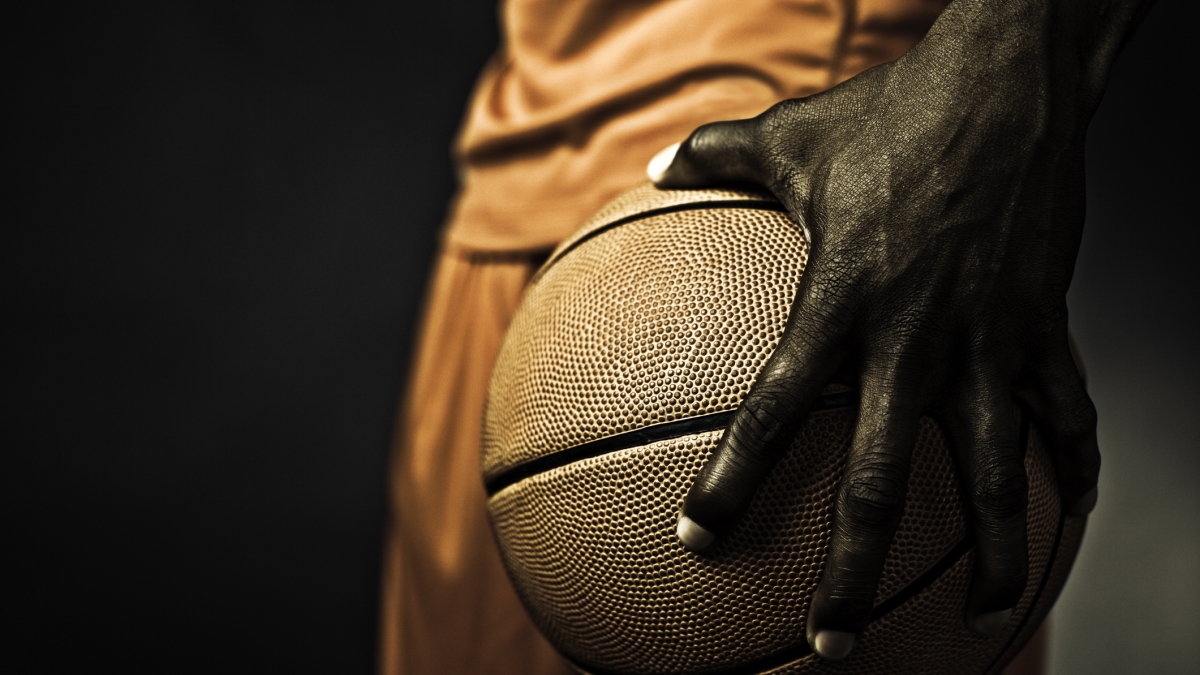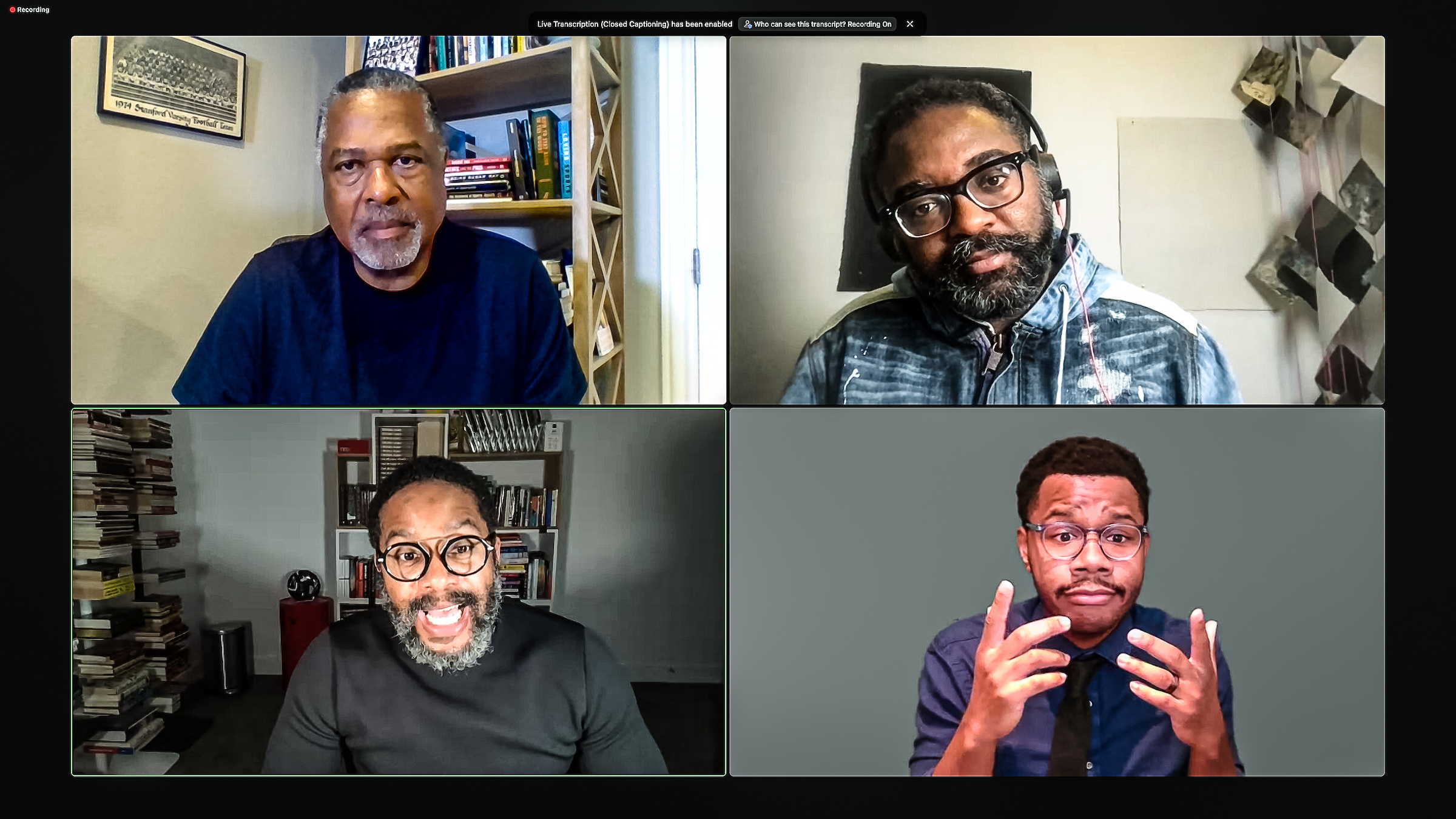Can participating in sports keep a young man out of trouble?
That was a question asked by Ken Shropshire, CEO of the Global Sport Institute at Arizona State University, who moderated a wide-ranging conversation with two prominent Black writers on Thursday.
“You can’t ask that of two people who have been prison,” replied Reginald Dwayne Betts, one of the writers.
Betts, a poet and MacArthur Fellow, and Mitchell Jackson, a Pulitzer Prize-winning journalist, joined Shropshire in the webinar, which was titled “Toward A Different Kind of Winning: Nurturing Black Creativity and Masculinity.”
Betts and Jackson both have been incarcerated. The webinar was in collaboration with ASU’s Center for Imagination in the Borderlands and the ASU Art Museum’s current exhibition, “Undoing Time: Art and Histories of Incarceration,” which is on display until Feb. 12.
Betts, who was convicted as a teenager for a carjacking, excelled at youth basketball, but never had the conversations about life beyond the dream of becoming a professional player.
“A lot of us lived in a vacuum, so we only thought in a short-sighted way about what was possible,” he said.
He also played while he was incarcerated, and caught the attention of a coach.
“He said, ‘I could get you into a Division 3 school on a scholarship,’” Betts said.
“I didn’t know Division 3 existed. It’s been 20 years and I’ve carried that compliment around with me. If somebody had told me (earlier) that I wasn’t going to get to the NBA, I could have gone to an HBCU and gotten a great education.”
Top left: Global Sport Institute CEO Kenneth Shropshire moderates a webinar with MacArthur Fellow Reginald Dwayne Betts, at top right. At lower left is Pulitzer Prize-winning journalist Mitchell Jackson. They participated in a webinar titled “Toward A Different Kind of Winning: Nurturing Black Creativity and Masculinity” on Thursday, Jan. 20. Jackson is the John O. Whiteman Dean’s Distinguished Professor in the Department of English at ASU. At lower right is the sign language interpreter. Screen grab by Charlie Leight/ASU News
Shropshire asked about the emphasis on sports. “With the idea of being a poet or a writer, of being a creative — how much does sports interfere with that space? How would we find a way to elevate the creative path?”
Jackson said that while coaches can create great players with minimal resources, teachers and schools need more support to pave the way for future writers.
“One of the things we need to remember is that for people coming up in tough neighborhoods, the schools’ academic excellence don’t nearly meet the excellence that’s available on the basketball court,” said Jackson, who is the John O. Whiteman Dean’s Distinguished Professor in the Department of English at ASU.
“You could be a brilliant and amazing coach, and all you need is You Tube, a basketball and hours in the gym. But that’s fundamentally not what you need to be an amazing teacher.
“The onus has to be on the structural critiques so we don’t put such a burden on these young athletes, who are like, ‘I can jump out of the gym but I can’t jump into a book I don’t own.’"
Jackson said he sees creativity in sports.
“It’s hard to watch Ja Morant or Steph (Curry) or LaMelo (Ball) and not think about really great jazz,” he said.
Betts, who coaches his kids’ basketball teams, talked about the coach as father figure.
“One of the proudest moments of my life is when parents run up to me in the hallway or at (the grocery store) and ask, ‘Are you coaching again?’
“Coaches can be like surrogate fathers,” he said. “It’s being a real presence in someone’s life. You need someone to care about you.”
Betts’ relationship with his own father was fraught, and during the webinar, he performed an excerpt about that from his multi-media solo show, “Felon: An American Washi Tale.” After prison, Betts graduated from Yale Law School and founded Freedom Reads, a nonprofit that provides books to prisons.
Jackson talked about the interplay of basketball and fathers and manhood.
“It’s a rite of passage to beat your father. Sports is one way to physically challenge your father without it feeling like you’re challenging his manhood or his authority. It’s a way to measure how far you’ve grown.
“A lot of fathers, especially Black men, won’t allow that challenge anywhere else in their lives, especially from their sons. It’s a measuring stick.”
Jackson’s uncle was like a father to him, and he vividly recalls the first time he beat the older man on the basketball court.
“He never beat me again, and that confidence materialized in other places for me.”
Top photo courtesy of iStock
More Arts, humanities and education

ASU professor's project helps students learn complex topics
One of Arizona State University’s top professors is using her signature research project to improve how college students learn science, technology, engineering, math and medicine.Micki Chi, who is a…

Award-winning playwright shares her scriptwriting process with ASU students
Actions speak louder than words. That’s why award-winning playwright Y York is workshopping her latest play, "Becoming Awesome," with actors at Arizona State University this week. “I want…

Exceeding great expectations in downtown Mesa
Anyone visiting downtown Mesa over the past couple of years has a lot to rave about: The bevy of restaurants, unique local shops, entertainment venues and inviting spaces that beg for attention from…



